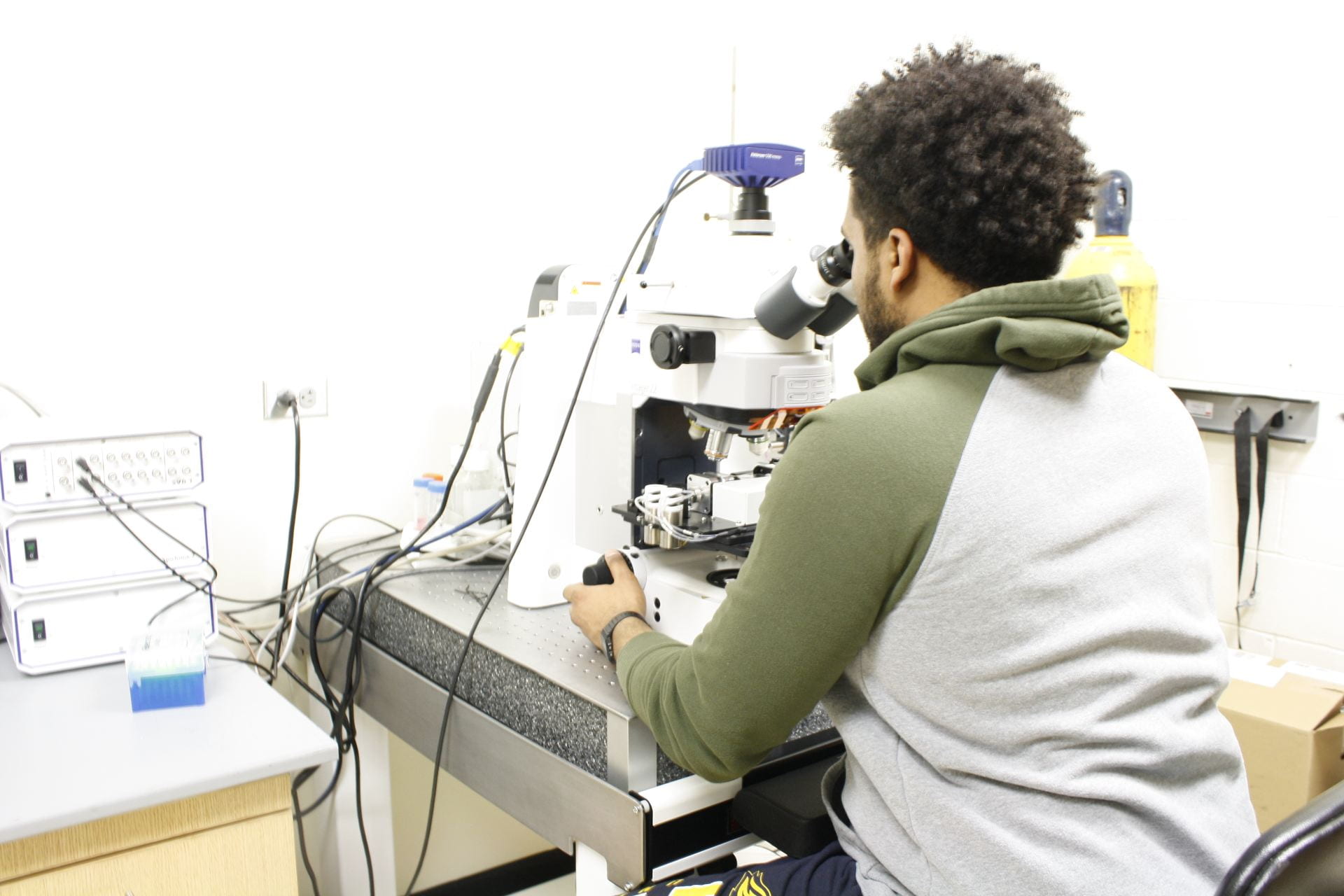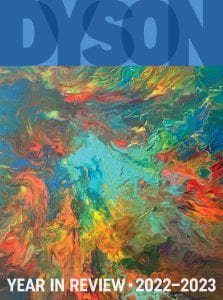The total amount of continued ($509,691) and new ($544,999) funding during the 2019–20 academic year from both the federal and private sector.
Research Notes
- Dyson students and faculty won big at the University’s Ninth Annual Student-Faculty Research Showcase, and sponsored by the Office of the Provost, Office of Research, Office for Student Success, and Pforzheimer Honors College. Seidenberg School of Computer Science and Information Systems student Allison Fisher ’22 and Associate Professor of English Kristen di Gennaro, EdD, were awarded up to $2,000 to support their project, Real and Imagined Linguistic Features of Contemporary Women’s Language. Carmela Piccolo ’22, an applied psychology and human relations major, and Assistant Professor of Psychology Courtney Gosnell, PhD, also earned the award for their work, The Effects of Positive Emotion Overexpression Based on Underlying Motives.
- Environmental science major Paris Baker ’21 and Kendra Dascano ’22, studying applied psychology and human relations, received Undergraduate Student-Faculty Research Initiative Awards to support research on pollution and COVID-19, respectively. The monetary award is offered annually through the Center for Undergraduate Research Experiences.
- An interdisciplinary team of science students shared new findings on hERG—a protein that helps to regulate cardiac function and enables the spread of cancer cells— that could aid in new and better drug treatments for cancer and heart disease. Their work appeared in the journal PLOS ONE.
- Environmental science undergraduate student Tatyana Graham ’22, along with Brielle Manzolillo ’18, BA Environmental Studies, and Nadya Hall ’18, MA Environmental Policy, had research on coyotes published in the journal Cities and the Environment. Aided by Assistant Professor Anne Toomey, PhD (environmental studies and science), they analyzed differences in perceptions of the animal.

A new imaging system on the Pleasantville campus provides fresh teaching, learning, and research capabilities.
Thanks to a grant from the National Science Foundation, the Dyson College of Arts and Sciences Departments of Biology and Chemistry and Physical Sciences have a new piece of equipment set to dramatically enhance and expand scientific research at Pace.
Described as a high-throughput imaging system, the state-of-the- art device allows faculty and students to gather and measure data that can be used in diverse areas of neuroscience research. It can process a large amount of data quickly, easily, and thoroughly, and gives the Pace science community access to the same microscopy and image analysis capabilities as can be found in laboratories at establishments including the Carnegie Institution for Science in Baltimore and the National Cancer Institute. It was installed on the Pleasantville campus earlier this year.
“It is incredibly convenient and useful for imaging many specimens at one time,” Kristie Oluyemi ’20, a behavioral neuroscience major, said.
Developed at Massachusetts Institute of Technology in 2010 and made commercially available by Union Biometrica, the machine will provide students with greater opportunities to experience working with large data sets, collaborate across departments and publish research findings. Some of the data generated will also be used in Pace University’s teaching laboratories to help strengthen STEM students’ quantitative and qualitative research skills.
“This system, in conjunction with the existing infrastructure, will enable us to do experiments that very few academic places have the capability to perform,” Assistant Professor of Biology Sally Marik, PhD said.
Professor Marik served as the principal on the grant application. She worked with fellow biology professors Nancy Krucher, PhD and Aaron Steiner, PhD, and Professor of Chemistry Sergey Kazakov, PhD.
The total amount of continued ($509,691) and new ($544,999) funding during the 2019–20 academic year from both the federal and private sector.

A new imaging system provides fresh teaching, learning and research capabilities.
Thanks to a grant from the National Science Foundation, the Dyson College of Arts and Sciences Departments of Biology and Chemistry and Physical Sciences have a new piece of equipment set to dramatically enhance and expand scientific research at Pace.
Described as a high-throughput imaging system, the state-of-the- art device allows faculty and students to gather and measure data that can be used in diverse areas of neuroscience research. It can process a large amount of data quickly, easily, and thoroughly, and gives the Pace science community access to the same microscopy and image analysis capabilities as can be found in laboratories at establishments including the Carnegie Institution for Science in Baltimore and the National Cancer Institute. It was installed on the Pleasantville campus earlier this year.
“It is incredibly convenient and useful for imaging many specimens at one time,” Kristie Oluyemi ’20, a behavioral neuroscience major, said.
Developed at Massachusetts Institute of Technology in 2010 and made commercially available by Union Biometrica, the machine will provide students with greater opportunities to experience working with large data sets, collaborate across departments and publish research findings. Some of the data generated will also be used in Pace University’s teaching laboratories to help strengthen STEM students’ quantitative and qualitative research skills.
“This system, in conjunction with the existing infrastructure, will enable us to do experiments that very few academic places have the capability to perform,” Assistant Professor of Biology Sally Marik, PhD said.
Professor Marik served as the principal on the grant application. She worked with fellow biology professors Nancy Krucher, PhD and Aaron Steiner, PhD, and Professor of Chemistry Sergey Kazakov, PhD.
Research Notes
- Dyson students and faculty won big at the University’s Ninth Annual Student-Faculty Research Showcase, and sponsored by the Office of the Provost, Office of Research, Office for Student Success, and Pforzheimer Honors College. Seidenberg School of Computer Science and Information Systems student Allison Fisher ’22 and Associate Professor of English Kristen di Gennaro, EdD, were awarded up to $2,000 to support their project, Real and Imagined Linguistic Features of Contemporary Women’s Language. Carmela Piccolo ’22, an applied psychology and human relations major, and Assistant Professor of Psychology Courtney Gosnell, PhD, also earned the award for their work, The Effects of Positive Emotion Overexpression Based on Underlying Motives.
- Environmental science major Paris Baker ’21 and Kendra Dascano ’22, studying applied psychology and human relations, received Undergraduate Student-Faculty Research Initiative Awards to support research on pollution and COVID-19, respectively. The monetary award is offered annually through the Center for Undergraduate Research Experiences.
- An interdisciplinary team of science students shared new findings on hERG—a protein that helps to regulate cardiac function and enables the spread of cancer cells— that could aid in new and better drug treatments for cancer and heart disease. Their work appeared in the journal PLOS ONE.
- Environmental science undergraduate student Tatyana Graham ’22, along with Brielle Manzolillo ’18, BA Environmental Studies, and Nadya Hall ’18, MA Environmental Policy, had research on coyotes published in the journal Cities and the Environment. Aided by Assistant Professor Anne Toomey, PhD (environmental studies and science), they analyzed differences in perceptions of the animal.

